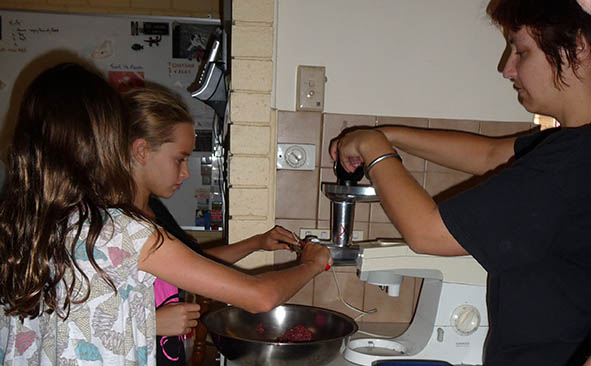Back to Basics
A friend of mine (in her mid twenties) recently confessed that when she left home a few years ago she had absolutely no idea how to cook. Growing up in the US, she’d thought that food ‘made from scratch’ involved packet / instant meals, rehydrated and heated. A meal made from individual fresh ingredients was virtually unheard of. ‘Geez, most of the fresh stuff – vegetables in particular – were a mystery to me the first time I saw them in a store.. I’ve learned pretty much everything I know since moving to Australia, especially in the last year.’
Although on one level I found this astounding – my own experience having been so very different – it also resonated with what I hear from other young (and not-so-young) people I meet. Namely that planning meals, shopping for ingredients, and then making even fairly basic food is not part of their worldview. They acknowledge the reality of the concept, but haven’t the skill set to engage with it on a practical level.
Processed foods, generally loaded with sugars and fats, are relatively inexpensive. Sadly, Australia is following the US trend and fast food outlets are becoming increasingly more accessible than stores selling fresh food. The result is that the combination of convenience, instant satisfaction (sugar high) and not having to plan makes them easy solution for many people.
And that’s what basic food preparation is about at its core. It’s not magic, it’s just planning – and experience.
I think it’s super important to provide our kids with the skills to feed themselves nutritious food made from scratch – and on a budget, since the trend in food prices is always on the rise. So here are some basic tips from when my kids were young:
- I encouraged them to experiment in the kitchen. We started small, baking cookies together. It was fun – and everyone got to eat the results, which they found very satisfying.
- From quite early on they started to help with basic food prep for dinner (grating carrots, cracking eggs into a bowl and whisking them, etc.). It entertained them and gave them the first stepping stones to managing in the kitchen independently.
- Praise worked wonders. I found that it built keen kitchen-helpers and – in the long run – very capable cooks.
- Show by example that making meals from fresh ingredients can be fun, easy and affordable.
- Recipes need to be simple to start with – not too many ingredients or too many steps, otherwise it’s simply too daunting.
- Create a recipe folder for each kid and each time they make something, print the recipe and add it to their file for future use. Boychilde recently told me that he still has his recipe file and continues to use it, 20+ years after we started it together. I’m pretty sure DaughterDearest does too 🙂
Having kids in the kitchen is messy and you could definitely do it more quickly and efficiently without their ‘help’ – at least to start with. But in due course they’ll start to pick up skills, knowledge and confidence. They’ll be able to start cooking meals occasionally and make decisions about grocery planning and what constitutes a balanced meal.
It’s skill building for their future – and it’s no small thing.

Yes, yes yes. I have two grown sons now who are both excellent cooks and foodies. When the eldest was 6 he banned me from helping him with a batch of muffins. I was allowed to turn on the oven and get them out, but that was it.
They didn’t rise a lot, but they were delicious.
The kitchen was often looked a disaster from the time they could stand on a large esky and help at the kitchen bench (about 2 and a bit) but it was worth it.
The words “I can do it, Mum!” were heard round here at that sort of age too. Now I get homemade scones or cookies delivered to me every Mothers Day 🙂